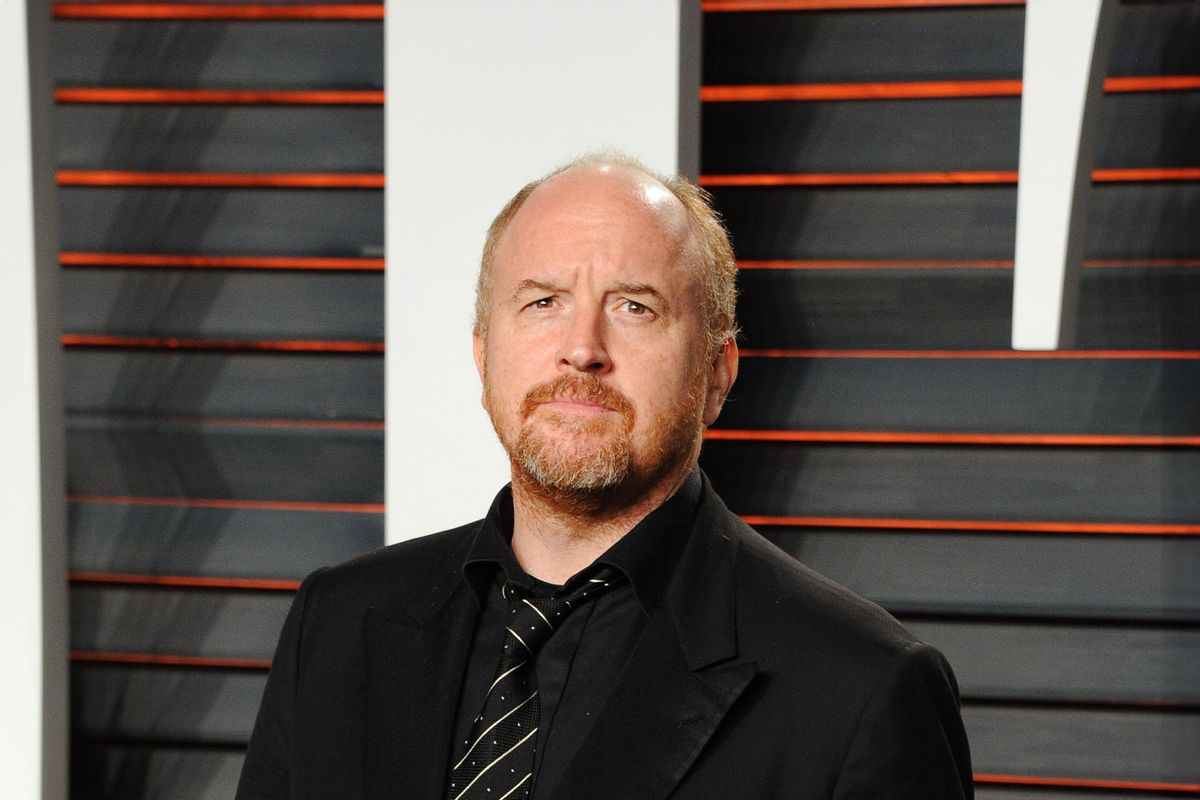“Sorry/Not Sorry” co-director Caroline Suh entered her examination of Louis C.K. as a fan. When the documentary filmmaker first read the 2017 New York Times story detailing his years-long pattern of sexual misconduct, she said her initial feeling was one of loss, “that kind of pain of like, ‘Oh, this is a shame that he’s no longer going to be able to perform.’ Obviously, that didn’t end up being the case.”
Equally as obvious, or it should be, is that Suh’s feelings about the comedian have changed. The same can be said about many who once considered themselves part of the comic’s fanbase and others who still do. His supporters seem more entrenched in their allegiance to C.K. than ever out of a respect for comedy itself, free speech or taking a stand against the #MeToo movement or whatever concept of political correctness exists.
Then there’s the camp in which Suh’s co-director Cara Mones was when she came to “Sorry/Not Sorry,” which is that of someone who didn’t know much about C.K.
“But it wasn’t until I worked on the project that I really started to get how people felt so personally connected to him and . . . how honest he seemed about human behavior and his personal life,” Mones said. “I think that it’s hard to believe bad things about the people we love, whether it be artists or even people in our personal lives. So I think I was surprised to kind of learn how much the story lived in a gray area for people.”
Of course he was going to make a comeback; it was only a matter of how soon and easy it would be to pull off.
That ambiguous space to which Mones and Suh referred in our recent Zoom conversation has ensured that C.K.’s case continues to have a starring role in rants about supposed cancel culture nearly seven years after the Times, which produces the documentary, broke the story.
In 2017 times reporters Melena Ryzik, Cara Buckley, and Jodi Kantor spoke with five women about their separate and unrelated encounters with C.K. during which he either asked if he could masturbate in front of them or simply did so in their presence.
Their report followed years of rumors circulating through the comedy community and a blind item printed by Gawker. Tig Notaro, whose comedy career got a boost from C.K. selling her remarkable stand-up set where she grapples with a cancer diagnosis on her site, portrays an incident akin to what C.K.’s accusers describe in a second season episode of her show “One Mississippi.” (It was one of many shows produced by C.K.’s production company Pig Newton.)
The Times article was published on Nov. 9. C.K.’s response with the headline “These Stories Are True” ran on the 10th. He immediately lost his deals with FX, his management company 3Arts, and Netflix, costing him $35 million.
We know that number because nine months after C.K. assured readers in his confession that he would “step back and take a long time to listen,” he casually dropped it during one of his stand-up routines he started doing again much to the surprise of the naive. Of course he was going to make a comeback; it was only a matter of how soon and easy it would be to pull off.
What few if any have done is make an informed calculation of what it cost C.K.’s accusers to come forward. “Sorry/Not Sorry” doesn’t offer a solid number either, although frankly, that may be an impossible undertaking. The comedy world’s compensation structure remains massively skewed toward favoring men.
Instead it does something equally as important, which is to show us the psychological and emotional cost of C.K.’s transgressions to the women forced to carry that secret and perhaps to comedy in general. Suh and Mones both raise the point the comic’s boosters bring up each time they petition for industry absolution, which is that he was never charged with a crime.
Mones recalls that in 2017, “It was very easy for people to say, you know, what [Harvey] Weinstein did was bad. And you know, Bill Cosby: bad.” What Louis C.K. did has a question mark hanging on it, she says, opening space for some people to search for a rationale as to why what he did isn’t the same as other powerful men accused or convicted of sex crimes.
“I don’t think people miss consuming Harvey Weinstein films,” Suh points out, whereas the personal connection C.K. fostered with his audience through his work made them more open to giving him a pass.
To her, that raises a lot of questions. “A lot of people kind of, in the conversations that followed, forget that he actually admitted to doing all of these things,” she said, “. . . and nevertheless, these women who just simply told their stories just gotten a tremendous amount of hate for it, even though he acknowledged it was true.”
The comedy world’s compensation structure remains massively skewed toward favoring men.
Featured among the many archival clips of his rise to mainstream stardom as excerpts of interviews he did with Matt Lauer on “Today” and Charlie Rose, figures found to have committed sexual misconduct themselves. But more sobering is the juxtaposition of a clip from May 2016 when University of Chicago undergraduate Dan Ackerman asked then-former “Daily Show” host Jon Stewart about what were then rumors about his friend Louis. C.K.
Stewart laughs off Ackerman for taking a series of tweets seriously only to express shock after the Times story ran.
Megan Koester in “Sorry/Not Sorry” (Greenwich Entertainment)Meanwhile, comics like Dave Chappelle reduced C.K.’s defenestration from the rarified circle of comedy’s top earners to a casualty of histrionics. In a 2018 Netflix special Chappelle paints C.K.’s accusers as weak or as having a “brittle-ass spirit.”
That refers to artist and comedian Abby Schachner, who described a phone call she had with C.K. to the Times during which it was clear that he was masturbating. Schachner’s encounter happened in 2003, a year after C.K. invited Chicago comedy duo Dana Min Goodman and Julia Wolov to his room at the Aspen Comedy Festival for what they assumed was a friendly nightcap to celebrate killing their late-night set.
Once they were there, he asked if he could take out his penis, then got naked and began masturbating in front of them. In these incidents and others, the women against whom C.K. committed his offenses were either disbelieved or encouraged to keep their stories to themselves.
Comedian and writer Megan Koester was not one of the named women in in the Times article but covered the rumors for online outlets before the Times landed interviews with the women C.K. targeted, denying for years that he had done so. She describes being aggressively silenced by one of the founders of the powerful Just For Laughs festival when she tried to bring up the murmurings about C.K. while reporting from the red carpet.
Wolov and Goodman declined to be featured in “Sorry/Not Sorry,” which the filmmakers understand. They and others already said their piece in 2017 and weren’t interested in doing it again all these years later.
But Schachner and Jen Kirkman, who alluded to her version of an uninvited solicitation from C.K. in a 2015 episode of her podcast but without mentioning his name, give their perspective on what it was like to endure something so horrendous, and what it’s like to watch C.K. enjoy a lucrative comeback.
C.K. may not have resumed appearing in TV series or movies. But his ability to circumvent the traditional entertainment structure and its politics has made him a hero among mainstream comics, nearly all of whom are happy to feature C.K. on their podcasts.
Since the Times broke its story, C.K. has enjoyed sold-out tours and venues as large as Madison Square Garden, along with scoring two Grammy nominations and a best comedy album win in 2022 for “Sincerely Louis C.K.,” his first recorded stand-up performance since admitting to sexual misconduct.
 Michael Ian Black in “Sorry/Not Sorry” (Greenwich Entertainment)Suh and Mones get a few prominent industry gatekeepers to speak openly in “Sorry/Not Sorry,” including Michael Ian Black and Michael Schur, who featured C.K. twice on “Parks and Recreation” despite being aware of the rumors about the comic.
Michael Ian Black in “Sorry/Not Sorry” (Greenwich Entertainment)Suh and Mones get a few prominent industry gatekeepers to speak openly in “Sorry/Not Sorry,” including Michael Ian Black and Michael Schur, who featured C.K. twice on “Parks and Recreation” despite being aware of the rumors about the comic.
Comedy Cellar owner Noam Dworman explains why he allowed C.K. to return to his stage, effectively smoothing the way for his return. The filmmakers don’t assign any feeling to his observations one way or another, choosing instead to present them from the cold perspective of the business and the way it coddles men – white men, mainly – while leaving others to scrape for drink vouchers.
Want a daily wrap-up of all the news and commentary Salon has to offer? Subscribe to our morning newsletter, Crash Course.
But the most galling aspect of C.K.’s career rebirth is that he never meaningfully atoned or actually apologized for his egregious abuse of power that derailed these women’s livelihoods. The word “sorry” doesn’t appear in his published admission, nor does “apology” or “apologize.” The closest he comes is to say, “The hardest regret to live with is what you’ve done to hurt someone else,” which is entirely about the effects his actions have had on him.
Suh said she never realized C.K. never said sorry until she and Mones began making the film, but that speaks to the process of the film as a realization.
“As you put the story together, and just lay out the facts in a very kind of straightforward way, it’s hard to look away from how damning it is really,” she said. “And in a banal, mundane way, it’s very dramatic to see just what happened, laid out very simply.”
One lingering question I put to Mones and Suh related to how wide a reach “Sorry/Not Sorry” may get in its wide release. Part of any movie’s press tour involves making the rounds on late-night talk shows, and a few daytime destinations like “The View,” the biggest of which are hosted by comics. That crowd includes Stewart, who made his own comeback to “The Daily Show” earlier this year.
Asked if any had extended an invitation to have them on, the filmmakers said no while pointing out that documentaries occupy a specialized niche that tends to be outside the promotional purview of platforms like “The Tonight Show.” Even so, a few hosts like Stewart have featured projects by filmmakers and authors who otherwise wouldn’t receive exposure on major TV platformers. It is not outside the realm of possibility.
Citing the archival footage of C.K. with Rose and Lauer, Suh pointed out the number of gatekeepers and tastemakers who are part of the problem. “There is a whole system at play,” she said, “And whether it affects this film, I don’t know. But you can kind of see how hard it would be if you are going up against that system like the women in the article did.”
“Sorry/Not Sorry” opens theatrically in New York and Los Angeles Friday, July 12 and is available on video on demand.
Read more
about this topic
